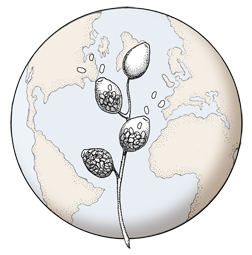Publication Type:
Journal ArticleSource:
FEMS Microbiology Letters, Volume 332, p.54–60 (2012)URL:
http://dx.doi.org/10.1111/j.1574-6968.2012.02574.xKeywords:
quarantine Phytophthora species, water pH, zoospore survivalAbstract:
Phytophthora ramorum, Phytophthora alni, and Phytophthora kernoviae present significant threats to biosecurity. As zoosporic oomycetes, these plant pathogens may spread through natural waterways and irrigation systems. However, survival of these pathogens in aquatic systems in response to water quality is not well understood. In this study, we investigated their zoospore survival at pH 3–11 in a 10% Hoagland’s solution over a 14-day period. The results showed that all three pathogens were most stable at pH 7, although the populations declined overnight irrespective of pH. Extended survival of these species depended on the tolerance of pH of their germinants. Germinants of P. alni ssp. alni and P. ramorum were more basic tolerant (pH 5–11), while those of P. kernoviae were more acidic tolerant (pH 3–9). These tolerant germinants formed compact hyphae or secondary sporangia to allow longer survival of these pathogens. Long-term survival at a broad pH range suggests that these pathogens, especially P. ramorum, are adapted to an aquatic environment and pose a threat to new production areas through water dispersal.


